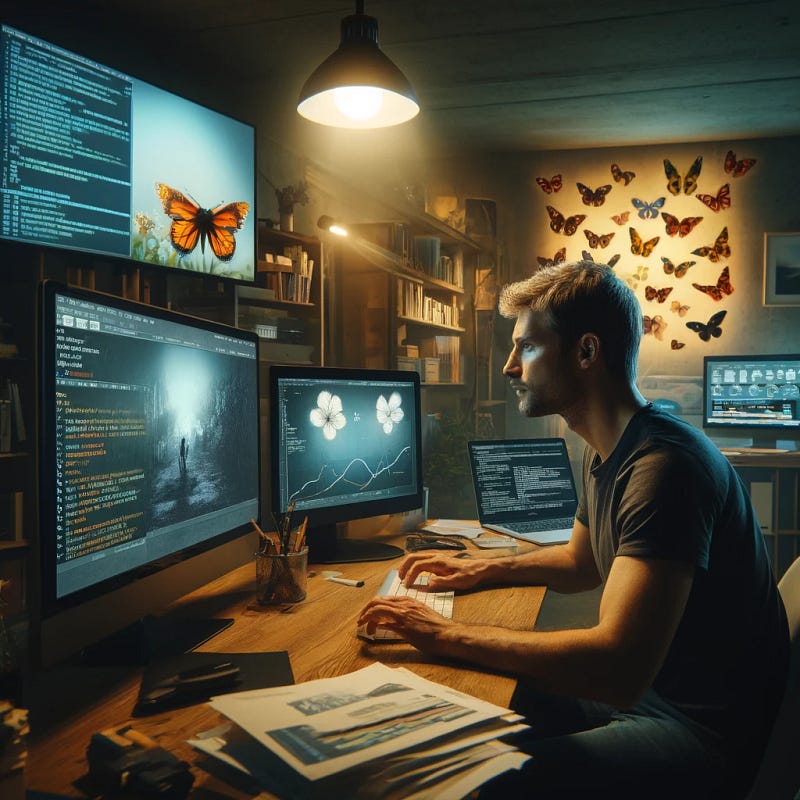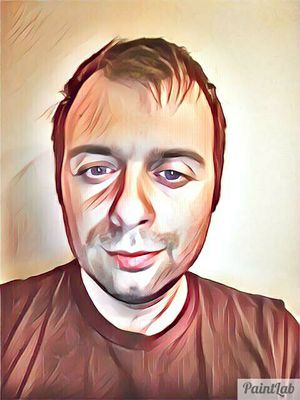Somewhere in space and time, there existed a rather ordinary world where people could live forever. Everything was set to perfection, but not everyone was perfectly content with it.
It was as simple as following these rules that become a motto for the whole population of the planet.
Sleep for 8 hours,
Jog for 1 hour each day,
Avoid stress beyond 10 minutes,
And forever you shall stay.
These rules were discovered long ago and set in stone as a universal way of life. The rules were discovered by sheer luck, in an era where big data and AI were a big thing. It was uncovered as an anomaly in the data that didn’t add up, ultimately unlocking the secret to human longevity.
That data discovery led to the revelation of some wealthy individuals who had lived for at least 10,000 years. Although these individuals wanted to keep this secret and could have prevented its revelation, they weren’t entirely sure what the secret was. Some of them naturally followed the rules of sleeping well, jogging, and maintaining low stress, without realizing that these habits contributed to their longevity. Once they were revealed, the rules were formalized for everyone.
The discovery was made by a background script run in a private cloud by a guy sitting in his basement. He was looking for clues while exploring the relationship between butterflies and human happiness. This is how most discoveries are made — one looks for one problem to resolve while finding solutions or clues for completely different problems or trends.

As these conditions were discovered and settled, naturally, everyone wished to live forever. This desire sparked a totally new blue ocean business. Various companies, both small and large, emerged with solutions, special devices, pills, and more.
Ion was sitting in his car, looking at the passing images of reality, imagining children playing outside. It was not unusual, not seeing children; it had been this way for some time. As people became less emotional and less involved in day-to-day conversations (since it led to stress), the birth rate decreased dramatically. This didn’t matter much, though, because the population remained stable.
Just before this ride to the stadium where he was heading, Ion had watched an old movie where the streets were full of cheerful people, children playing, and dogs barking.
Nobody wanted to die, and nobody does, except in rare incidents. People avoided going outside due to the increased value they placed on their lives. It was one thing to die in an incident if you knew you would die sooner or later, but it was an entirely different matter to lose your life when you had eternity ahead of you.
Now, sitting in his car, Ion gazed at the empty streets. A tiny glimpse of emotion flashed and faded away in an instant. The dashboard beeped, indicating “plus one second”. He settled back into the comfortable chair of his limo-like car, relaxed.
As society adjusted to these new conditions, people became increasingly interested in reminiscing about the “good old days.” Reading books, watching television shows, and immersing themselves in stories from the past became popular ways to pass the time. This nostalgia served as an emotional intake that didn’t pose a risk to their longevity if experienced in small portions.
To maintain their emotional well-being without jeopardizing their lives, people learned to control their stress levels very precisely, ensuring they never exceeded 9 minutes and 59 seconds of stress per day. Whether the stress was a negative emotion or a positive one, such as joy, it was still considered stress and counted towards their daily limit and alerting thresholds.
Initially, joy was seen as beneficial for human longevity. Studies showed that happiness could boost the immune system, reduce stress, and even extend life expectancy. However, the data also revealed a darker side: the inevitable follow-up of disappointment or sorrow. The highs were often followed by deep lows, creating a rollercoaster of emotions that ultimately destabilized mental and physical health.
Faced with this paradox, the architects of the AI system, alongside leading scientists and investors, decided on a radical approach. They concluded that maintaining a low, stable emotional profile would, on average, be more beneficial. By minimizing the emotional peaks and valleys, they could create a more consistent and controlled environment for the population.
Thus, emotions were regulated. People were allotted ‘emotional time’ as a bonus, a finite resource to be used wisely.
This system acted as a motivation engine, providing just enough emotional fuel to carry out necessary tasks. For example, jogging for an hour each day required emotional input. Without it, even the promise of eternal life wouldn’t be enough to motivate most people.
The combination of smart devices and advanced biotech did its job, keeping people very well-balanced. These technologies monitored their physical and emotional states, adjusting as needed to maintain optimal health and minimize stress.
In this brave new world, life was carefully managed and controlled by the Global Healthcare AI. People found ways to engage with their emotions safely, ensuring they could still experience the richness of life without risking their newfound longevity. The range of time when emotions could be safely experienced was limited.
The balance between emotional fulfillment and physical health is a crucial aspect of daily life, since our society values both the past and the future.
At least that was the motto of most of the small and large corporations that eventually merged with the governmental branch (the only branch left) and became the Healthcare system for the entire planet. It provided new services for the people of the new Earth. Yet, the balance of value was slowly drifting towards the past, not the present or the future.
As technology advanced, driving became a thing of the past. Self-driving cars took over the roads, eliminating the need to worry about reckless drivers.
That is where Ion found himself, in the car, hazing at the present as it passed over his dimmed consciousness with reflections of trees, birds, and the bright sun. He sat comfortably in his chair, staring straight ahead, gently blinking, his facial muscles relaxed.
The trend in the society was definitely of living a low-profile life. People preferred cars with tinted windows, ensuring that they couldn’t be seen from the outside and had limited visibility and accessibility of the world themselves.
Even though the biotech devices could manage emotional spikes, living a low-profile life became the new normal anyway. It was reminiscent of the old-fashioned politeness found in countries of the past, where people would say “sorry” to each other and maintain a respectful distance. In the past, this distance was partially due to the time spent commuting to places like Wholesale Warehouses (long forgotten), work-long hours, over-exposure to social media, that lead to the lack of time and energy for meaningful communication. Now, with the “new balance”, this low-profile existence had taken things to the next level.
Ion, and everyone else, mostly, felt comfort in their self-contained environments, where interactions were minimal, and privacy was maximized. The new normal was a quiet, reserved way of life, where the preservation of one’s emotional and physical well-being took precedence over social engagement.
Ion knew that he had his whole life ahead of him.
There was a low risk that something might go wrong. All wars had ended. People no longer had sufficient reasons to engage in such madness, nor did they possess the emotional capacity for it. There was no need to work; everything was fully automated by the Healthcare AI — food, devices, transport.
He was in his 25 (for the last 200 years).
His self-driving car drives him to the stadium where he had an appointment. He needed to run for 1 hour to maintain his health, as suggested by the rules.
“To live long, balanced lives, embracing the future,”
A message flashed on the car dashboard as a priming reminder.
Ion’s car glided smoothly through the streets, its tinted windows shielding him from the outside world. The hum of the engine was barely audible, adding to the serenity of his journey. Ion stared at the car’s dashboard, watching the digital display show the route to the stadium.
He has arrived.
He stepped out of his car, the cool air brushing against his face. The device implanted in Ion’s body injected a small amount of substance into his bloodstream to minimize the emotional impact. The stadium’s entrance loomed ahead, and Ion made his way inside.
As he approached the stadium, Ion felt a familiar sense of detachment.
“Holding onto a sense of nostalgia for the past is inevitable, and I know it”, he thought, repeating it again and again. “It is okay. It is totally okay”.
The stadium was a place where people came to fulfill their jogging requirement, but it was devoid of the social interactions that once characterized such places. The runners were focused on their tasks, each person maintaining their low-profile existence, just like Ion would do now.
He took a deep breath, preparing for his hour-long run. This routine was essential for his longevity, and while it had become second nature to him.
Ion sighed as he prepared for his daily run. He glanced at his emotional intake meter — it had granted him just enough for the hour-long jog. He knew he had to use it wisely; every second of joy was carefully measured and rationed.
Ion began to run, his footsteps echoing in the nearly empty stadium. Each lap around the track was a contribution to the delicate balance he maintained between his physical and emotional well-being. The isolation was both a comfort and a burden — the sacrifice for immortality.
‘Just one more minute, one more kilometer,’ he muttered to himself, feeling the slight surge of motivation provided by his emotional allowance. It was a strange existence, where even something as simple as running required this artificial boost. Ion remembered a time when he could feel happiness and sorrow in full measure, a time before the AI system controlled every emotional nuance.
As Ion ran, he thought about the past, the “good old days” when life was less controlled and more spontaneous. The memories brought a faint smile to his face, but he quickly refocused on his run. He couldn’t afford to let nostalgia disrupt his careful balance. Yet even the nostalgia was good enough for the run-fuel.
After his run, Ion felt the familiar drain. His emotional reserve for the day was almost depleted, leaving him in a state of serene neutrality. He missed the highs and even the lows, but he understood the logic. It was about balance, about preventing the emotional crashes that followed the peaks. Still, it felt like something fundamental was missing.
The hour passed, and Ion finished his run. He walked back to his car, his body refreshed but his mind somewhat heavy with thoughts. The self-driving car took him home, back to his delicate equilibrium.
Next:
To Live Forever. Book 1. Chapter 2. Phengaris Alcon.
Phengaris Alcon, or the Alcon Blue, is a blue butterfly that has a unique parasitic relationship with ants. Its…medium.com
Looking for your support. The goal is to publish this book 📖! I am planning to fill it with authentic pictures as well (so far it's AI generated one, that not always fit). To ask some art student to add those final touches.

